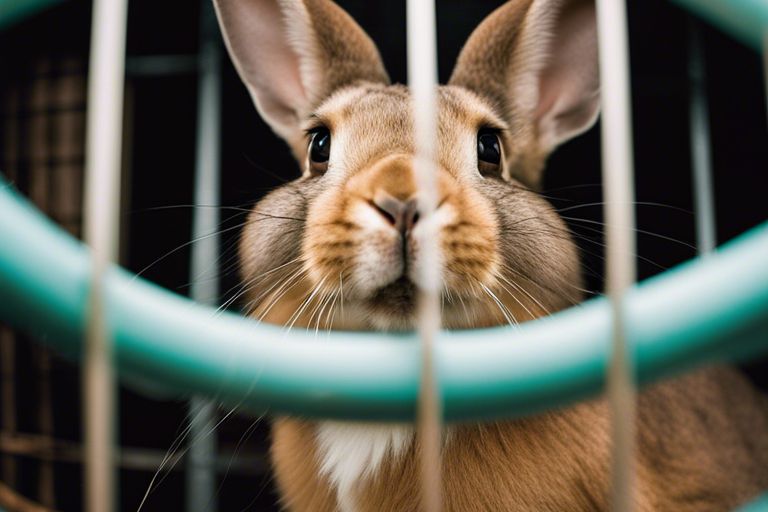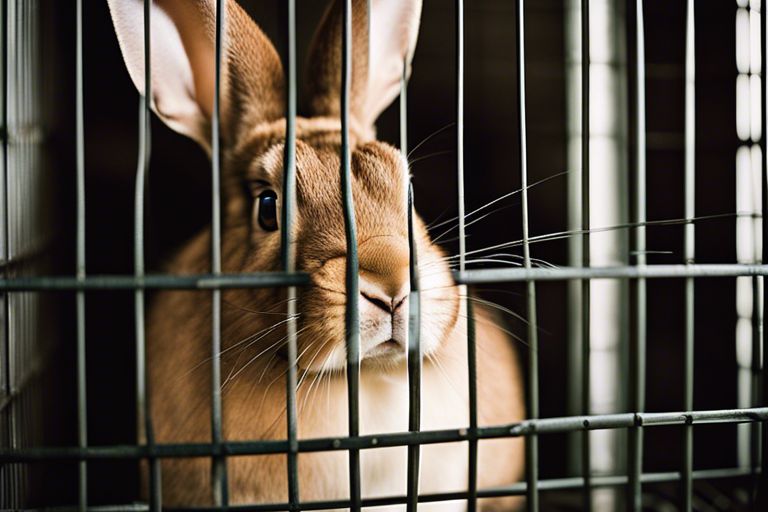Have you ever wondered how Flemish Giants react when they are confined in a small space? While these gentle giants are known for their size and friendly demeanor, confining them to a small space can have serious consequences on their physical and mental well-being. In this blog post, we will explore the negative effects of confinement on Flemish Giants, as well as provide tips on how to create an environment that promotes their health and happiness.
Key Takeaways:
- Flemish Giants may become stressed and agitated when confined in a small space. This can lead to behavioral issues and health problems.
- Physical activity is essential for Flemish Giants, so being confined in a small space can negatively impact their physical health and wellbeing.
- Providing a larger, more spacious environment for Flemish Giants is crucial to their overall happiness and health.
- Enrichment activities and stimulation are important for confined Flemish Giants to prevent boredom and lethargy.
- Regular interaction and socialization with their owners or other rabbits is necessary for the mental and emotional well-being of Flemish Giants in small spaces.
Flemish Giant Characteristics
Obviously, as the name suggests, Flemish Giants are quite large in size. They are one of the largest rabbit breeds, with males typically weighing 13 to 14 pounds and females weighing 14 to 16 pounds. In addition to their size, they are also known for their gentle and docile nature, making them popular as pets.
Size and Strength Considerations
When considering the characteristics of Flemish Giants, their size and strength should not be underestimated. These rabbits have powerful hind legs and can easily injure themselves or others if they feel confined or threatened. It’s crucial to provide them with enough space to move around comfortably and to avoid handling them roughly to prevent injury to both the rabbit and yourself.
Temperament and Socialization
Flemish Giants have a calm and friendly temperament, making them suitable companions for families. They can be social animals, and they often enjoy interacting with their human family members. However, they may not always get along with other pets, especially smaller animals that they may view as prey. Proper socialization and supervision are essential when introducing them to other pets in your household.
Child-Friendliness and Pet Compatibility
These rabbits can be great pets for families with children, as they are generally tolerant of handling and gentle with kids. However, it’s important to teach children how to handle them properly to avoid any accidental injuries. When it comes to pet compatibility, Flemish Giants can coexist with other pets, but introductions should be done gradually and under supervision to ensure everyone’s safety.
As you consider the characteristics of Flemish Giants, it’s important to understand their size and strength, temperament, and compatibility with children and other pets. By being aware of these key aspects of their nature, you can create a suitable living environment for them and ensure a harmonious coexistence with your family and other pets.
Housing and Confinement
Now, let’s talk about the housing and confinement of Flemish Giants. As a responsible pet owner, it’s important to consider the impact of confinement on your furry friend.
The Effects of Confinement on Flemish Giants
When confined to a small space, Flemish Giants can become stressed and anxious. This can lead to behavioral issues such as aggression, depression, and self-harm. Additionally, lack of space can impact their physical health, causing obesity and musculoskeletal problems. It’s crucial to understand the negative effects of confinement on your pet.
Space Requirements and Enrichment
Flemish Giants require a significant amount of space to thrive. They are large, active animals that need room to move around and stretch their legs. Providing them with a spacious living area, as well as enrichment activities such as toys and tunnels, is essential for their well-being. Enrichment helps stimulate their minds and prevents boredom, which can lead to destructive behavior.
Health Implications of Improper Housing
Improper housing, such as confining a Flemish Giant to a small cage, can have serious health implications. Conditions like pododermatitis, commonly known as sore hock, can develop from standing on wire flooring for extended periods. Inadequate space can also lead to a weakened immune system, making your pet more susceptible to illnesses. It’s crucial to provide your Flemish Giant with a proper living environment to ensure their health and happiness.
By understanding the effects of confinement on Flemish Giants, you can make informed decisions about their housing and well-being. Providing sufficient space and enrichment is essential for their physical and mental health. It’s important to be mindful of the potential health implications of improper housing and take proactive steps to ensure your pet’s well-being. As a responsible pet owner, your priority should be creating a safe and comfortable environment for your furry friend.
 Sure, here is the text for the next chapter:
Sure, here is the text for the next chapter:
Care and Management Strategies
However, there are various care and management strategies you can implement to ensure that your Flemish Giant rabbit remains healthy and content even when housed in a small space. By focusing on nutrition and diet considerations, grooming and shedding management, training and positive reinforcement techniques, as well as proper veterinary care, you can provide the best possible environment for your beloved pet. Let’s explore these strategies in more detail.
Nutrition and Diet Considerations
When it comes to nutrition and diet considerations for your Flemish Giant rabbit, it’s crucial to provide them with a balanced diet that includes plenty of fiber-rich hay, fresh vegetables, and a small amount of pellets. Additionally, ensure they have access to fresh water at all times. A well-balanced diet is essential for maintaining your rabbit’s overall health and well-being.
Grooming and Shedding Management
Grooming and shedding management are important aspects of caring for a Flemish Giant rabbit. Regular grooming, including brushing and nail trimming, is necessary to keep their coat in good condition and prevent any discomfort. Additionally, be prepared for seasonal shedding, and provide regular grooming sessions to help your rabbit stay comfortable and healthy.
Training and Positive Reinforcement Techniques
Training and positive reinforcement techniques can be valuable tools for managing your Flemish Giant rabbit’s behavior, especially in a confined space. Through gentle training and positive reinforcement, you can encourage good habits and discourage undesirable behaviors such as chewing on furniture or excessive digging. Remember, patience and consistency are key when training your rabbit.
Veterinary Care: Check-ups and Parasite Prevention
Regular veterinary care, including check-ups and parasite prevention, is essential for maintaining your Flemish Giant rabbit’s health. Schedule routine check-ups with a knowledgeable veterinarian to ensure your rabbit is in good health and to address any concerns or potential health issues. Additionally, follow your vet’s recommendations for parasite prevention to safeguard your rabbit’s well-being.
Behavioral Perspectives
Despite their large size, Flemish Giants do not respond well to being confined in a small space. When confined, they may exhibit stress responses and territorial behaviors, which can negatively impact their overall well-being.
Stress Responses and Territorial Behavior
When confined in a small space, Flemish Giants may exhibit stress responses such as excessive grooming, chewing on objects, or even aggressive behavior. They are naturally territorial animals and may become agitated when they feel confined, leading to behaviors such as marking their territory or displaying signs of dominance. These stress responses and territorial behaviors can lead to psychological distress and negatively impact the rabbit’s physical health.
Alternatives to Small-Space Confinement
If you are unable to provide a large, free-roaming space for your Flemish Giant, consider providing alternative forms of enrichment. This may include interactive toys, tunnels, or climbing structures that allow the rabbit to exercise and explore its environment. It’s important to provide your rabbit with plenty of mental and physical stimulation, even in a confined space, to prevent stress and boredom.
Exercise Requirements and Canine Enrichment
Flemish Giants have high exercise requirements and need ample space to move around and stretch their legs. If confined to a small space, it’s crucial to ensure that they receive adequate exercise and enrichment. You can achieve this by incorporating regular playtime outside of their enclosure, allowing them to hop and explore in a secure, supervised environment. Providing opportunities for exercise and enrichment is essential for maintaining your rabbit’s physical and mental well-being.
Conclusion
Summing up, it is important to consider the well-being of your Flemish Giant rabbit when they are confined to a small space. Although these rabbits are adaptable and can tolerate being confined, it is essential to provide them with enough space to move around, exercise, and exhibit natural behaviors. Remember to provide them with a clean and comfortable living environment to ensure their overall health and happiness. By understanding their needs and accommodating them as best as you can, you can ensure a positive and enriching experience for your Flemish Giant.
FAQ
Q: Do Flemish Giants do well in small spaces?
A: Flemish Giants are large rabbits and require ample space to move around comfortably. They do not respond well to being confined in small spaces and may become stressed or aggressive. It is recommended to provide a large enclosure for Flemish Giants to ensure their well-being.
Q: How do Flemish Giants behave when confined in a small space?
A: When confined in a small space, Flemish Giants may exhibit signs of discomfort such as excessive chewing, digging, or attempting to escape. They may also become territorial and may display aggressive behavior towards other animals or humans. It is important to monitor their behavior closely and provide a suitable environment to prevent any negative reactions.
Q: What are the potential health issues associated with confining Flemish Giants in a small space?
A: Confining Flemish Giants in a small space can lead to a variety of health issues including obesity, muscle atrophy, and behavioral problems. Lack of exercise and mental stimulation can also result in boredom and stress-related disorders. It is essential to allow them to have enough space for movement and provide enrichment activities to maintain their physical and mental well-being.
